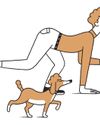
Imagine you’d been born in 1899. Imagine living through the invention of the Model T, the jet aircraft, the liquid-fuelled rocket, and the computer chip. Now imagine looking back on all this in 1965 and writing, as though with a shrug, “How slow will we appear some day?”
It takes an uncommon turn of mind to survive decades this dizzying and then sum them up with perfect nonchalance—but a lot of the greatness of Anni Albers lay in her ability to stay undizzied and keep doing her thing, year after year. Not that she was afraid of innovation; her thing just happened to be weaving, an art form that, by her own calculation, had not changed in any fundamental way since the Stone Age.
Critics reach for a few keywords with Albers: “crisp,” “precise,” “mathematical.” I would like to propose “frightening.” Her work arouses the suspicion that beauty is simple and we’ve all been overthinking it. None of the shapes or colors in “Pasture” (1958), a smallish plot of mainly red and green threads, would be out of place on a roll of Christmas wrapping paper. The trick is that each component lingers long enough to make any change feel like an event; checkerboard red-and-green switches to green on-black, then green-on-black but with stutters of white and red. Patterns unfold horizontally, but every so often a twisted pair of vertical threads (it’s called a leno weave) slashes its way out of the grid. An invisible logic, mysterious but never precious, presides. Most visual art addresses whoever happens to be looking at it. “Pasture” stares straight through you, at some distant, tranquil future in which primordial beauty is the only kind left.
Denne historien er fra April 22 - 29, 2024 (Double Issue)-utgaven av The New Yorker.
Start din 7-dagers gratis prøveperiode på Magzter GOLD for å få tilgang til tusenvis av utvalgte premiumhistorier og 9000+ magasiner og aviser.
Allerede abonnent ? Logg på
Denne historien er fra April 22 - 29, 2024 (Double Issue)-utgaven av The New Yorker.
Start din 7-dagers gratis prøveperiode på Magzter GOLD for å få tilgang til tusenvis av utvalgte premiumhistorier og 9000+ magasiner og aviser.
Allerede abonnent? Logg på

LIFE ADVICE WITH ANIMAL ANALOGIES
Go with the flow like a dead fish.

CONNOISSEUR OF CHAOS
The masterly musical as mblages of Charles Ives

BEAUTIFUL DREAMERS
How the Brothers Grimm sought to awaken a nation.

THE ARTIFICIAL STATE
A different kind of machine politics.

THE HONEST ISLAND GREG JACKSON
Craint did not know when he had come to the island or why he had come.

THE SHIPWRECK DETECTIVE
Nigel Pickford has spent a lifetime searching for sunken treasure-without leaving dry land.

THE HOME FRONT
Some Americans are preparing for a second civil war.

PRESIDENT FOR SALE
On a mid-October Sunday not long ago sun high, wind cool-I was in Harrisburg, Pennsylvania, for a book festival, and I took a stroll.

SYRIA'S EMPIRE OF SPEED
Bashar al-Assad's regime is now a narco-state reliant on sales of amphetamines.

TUCKER EVERLASTING
Trump's favorite pundit takes his show on the road.